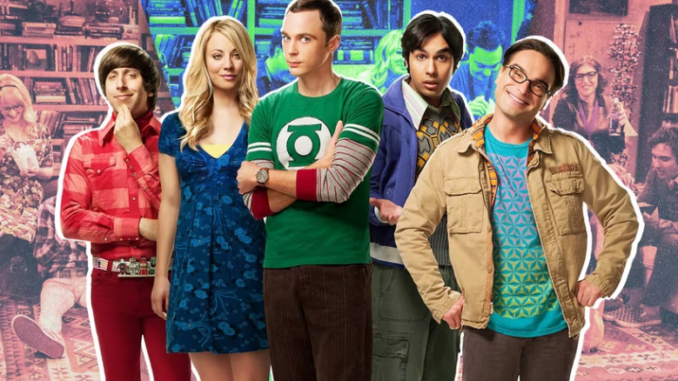
How The Big Bang Theory Ended
The Big Bang Theory ran for 12 seasons on CBS before coming to a satisfying conclusion. Here’s where Sheldon and the gang ended up in the finale.
The Big Bang Theory was an unexpected hit, becoming one of the most-watched sitcoms of the 21st Century. The series had mixed reviews in its first season, which debuted on CBS in late September 2007. However, audiences soon fell in love with the amiable nerds and their friend, Penny. That popularity helped the show become one of the longest-running sitcoms of all time. The Big Bang theory also played a significant role in bringing nerd culture to the forefront of the mainstream public consciousness.
Over 12 seasons, The Big Bang Theory introduced long-running gags, witty characters, endless cameos, and storylines that ranged from hilarious to heartwarming. It garnered legions of awards and nominations, then inspired a popular and sometimes surprising spinoff, Young Sheldon, debuting its seventh and final season in May 2024. The show went out on a high, with Variety reporting it scored nearly 20 million viewers for its two-part finale. Even after new episodes stopped airing, the series lives on in syndication. The question looming over its legacy, however, is how well the series wrapped up its story.
Updated on February 26, 2024, by Andrea Sandoval: The Big Bang Theory is one of the longest sitcom series ever created, with a run of 12 seasons. As such, its main characters go through much growth, finding love, and family, and exploring various career paths. The ending of The Big Bang Theory was incredibly rewarding, as it brought the characters to their true potential. We updated this feature to further the discussion surrounding The Big Bang Theory finale.
What The Big Bang Theory Was About?
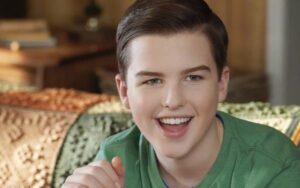
Set in Pasadena, California, The Big Bang Theory centered on an ensemble, led by a pair of Caltech physicists named Leonard Hofstadter and Sheldon Cooper — played by Johnny Galecki and Jim Parsons, respectively — awkward geniuses with a love of everything geeky. Kaley Cuoco’s character was Penny, the beautiful aspiring actor (but working food server) from Nebraska, who moved in across the hall and became an unlikely addition to their friend group. The Big Bang Theory’s ensemble cast was rounded out by engineer Simon Helberg’s Howard Wolowitz and astrophysicist Kunal Nayyar’s Rajesh Koothrappali. Eventually, Mayim Bialik’s Amy Farrah Fowler and Melissa Rauch’s Bernadette Rostenkowski joined the cast as romantic additions to the friend group.
Interestingly, The Big Bang Theory almost looked very different. The first pilot included a character named Kate, played by Amanda Walsh, but the pilot didn’t work. Funny enough, The Big Bang Theory joins an elite club the characters would approve of as another series with a first failed pilot was Star Trek, a series adored by Sheldon, Leonard, and the gang. “CBS called after the first pilot and asked if we could do it again and recast the female lead… but my response to them was, ‘No, I don’t think it was a casting problem, I think it was a writing problem.’ Our script didn’t fully realize what our possibilities were,” Chuck Lorre told Entertainment Weekly. In the first pilot, Kate is cruel to the other characters and sees them as people to take advantage of. Penny, instead, was charmed by them and tried to bring them out of their shells by “watching DVD commentaries” and playing Dungeons & Dragons.
At its core, The Big Bang Theory was a hangout comedy built around a friend group of (mostly) geniuses, and their quirky, nerdy antics. The “will they or won’t they” relationship between Penny and Leonard was a driving force throughout the sitcom’s run. However, Jim Parsons stole the show with his nuanced portrayal of Sheldon Cooper, which made a relatively unlikeable character into a fan favorite. It was no surprise that Sheldon got his own spinoff, though Young Sheldon has been far more dramatic. Still, Lorre and his fellow writers were correct. The friendships between the central characters are what made this series shine, even when it fell into sitcom tropes.
How Penny and Sheldon Evolved by The End of The Big Bang Theory
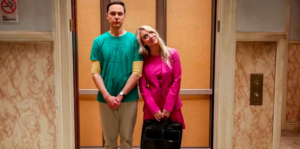
Every character in The Big Bang Theory dramatically evolved throughout its lengthy run, but no one went through as significant a transformation as Penny. She began as a shallow, naive girl from Nebraska who came to California to pursue her lofty goal of becoming a movie star — but ended up a server at the Cheesecake Factory. By the series’ end, Penny was a more mature character with a good job as a pharmaceutical sales representative, trading in her apron for professional pantsuits.Penny’s journey was all about finding joy in the place she was rather than where she hoped to be. Meanwhile, as sympathetic as The Big Bang Theory’s male characters were, they remained in a state of arrested development. Lorre said he believed the Katie character didn’t work because the audience saw these grown men as childlike. Penny helped them grow up, and, in turn, she learned to appreciate the good things in life rather than lament what she didn’t have. She also found love in an unlikely place. By the end of The Big Bang Theory, Penny and Leonard are happily married and expecting their first child, even though at the beginning of the series, Penny is terrified of commitment.
Sheldon went on his own important journey throughout The Big Bang Theory. After a comically long time, he eventually married Amy, along with finally learning to detect sarcasm. In the finale, Amy confronts him about his selfishness, leading his character to a final revelation. He set aside the lengthy, egocentric speech he planned to deliver at his Nobel Prize ceremony and thanked each of his friends individually instead. In a moving gesture, he asked each of them to stand, told them he loved them, and apologized for not being a better friend. It was an important moment of growth for the character that worked even though Sheldon’s obliviousness was an integral part of the series’ comedy.
How Did The Big Bang Theory End?
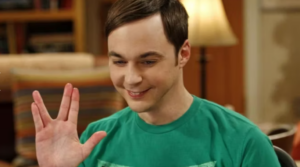
When it finally came to an end on May 16, 2019, The Big Bang Theory neatly tied up most of its unanswered questions and gave satisfying conclusions to its beloved characters. The finale centered around Sheldon and Amy finally winning the aforementioned Nobel Prize. The episode brings all of its iconic characters along for the ride, with the whole gang accompanying them to Sweden for the ceremony to support their friends’ achievements. After seeing unflattering photos of herself all over the Internet, Amy used some of the prize money to buy herself a new wardrobe and a makeover. Her transformation was stunning and brought out a shining inner confidence that she’d always deserved.
Howard went from the most childish member of the group into an adult with a happy marriage to Bernadette. For five seasons, Bernadette and Howard’s children only existed off-screen, but The Big Bang Theory’s finale gave the first and only glimpse of their family. Howard also played a major part in Raj’s conclusion. Although he met future Wolf Pack star Sarah Michelle Gellar on the plane to Sweden, Raj received the least satisfying ending. Raj planned to go to London and propose to his girlfriend Anu, but Howard stopped him at the airport. The two shared a touching moment when Howard told Raj there was someone better for him, and that he should stay in California. Raj did get the big, romantic movie moment he always wanted, just not exactly as he pictured it.
In the meanwhile, Penny and Leonard continue to be happily married and living in the iconic apartment Leonard used to share with Sheldon — Sheldon and Amy, living in Penny’s old apartment. Another incredible development happens: the elevator, which had been broken throughout the 12 seasons of The Big Bang Theory, is finally fixed. The series also states that Penny is pregnant, so Penny and Leonard will start a family of their own. The couple hosts their friends one last time as the final scene finds the group in their natural state: sitting around the coffee table eating takeout, happy and laughing. An acoustic version of The Big Bang Theory’s famous theme song played as their lives went on, just no longer shown to millions of fans.
Will The Big Bang Theory Get a Revival?
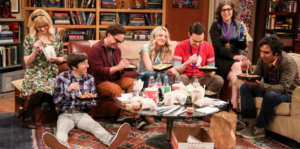
While the ending of The Big Bang Theory was pretty rewarding, fans often want more of a series after it’s done, and The Big Bang Theory is no different. In the above-mentioned Entertainment Weekly interview, the series co-creators dismissed the idea of rebooting the sitcom despite their desire to work with the characters and cast again. “I know that people do get characters together for reunions and things like that, but it’s hard to imagine what you would see after the finale because I found the finale was one of the most beautiful and satisfying episodes. The closure it brought was astonishing. It’s hard to imagine reopening the story after that,” Bill Prady said. Still, fans have 279 episodes with these characters to watch and rewatch, just like the boys would with their favorite show.
The Big Bang Theory had one of the best sitcom finales, and it would be hard to reopen the story. The story ends with Howard and Bernadette having two children, Sheldon and Amy married, Penny and Leonard expecting a baby, and Raj learning to take care of himself. But more importantly, the show ended with the gang still together. Most sitcoms end the story with the characters moving on to greener and better pastures. Friends end when Monica and Chandler move from their iconic apartment, How I Met Your Mother implies that the friend group dissolves after Barney and Robin’s wedding, and Modern Family finishes when everyone grows up and moves on with their lives.
However, The Big Bang Theory doesn’t force its character to make a drastic change to end the story, and it’s very much stated that they will continue to be close. The show even ends with the characters hanging out like they did for most of the series. Moreover, they all live in the same places even though they’re married. The Big Bang Theory has the most realistic and relatable ending. On top of that, it shows the audience that platonic relationships are as important as romantic ones, making it the best series finale in a sitcom.